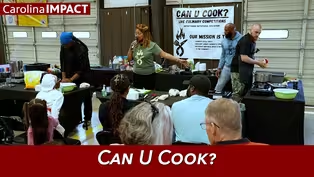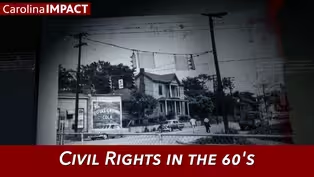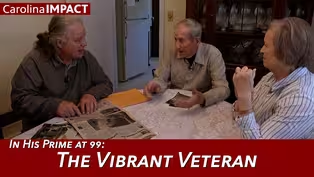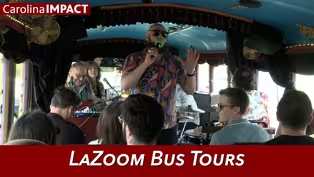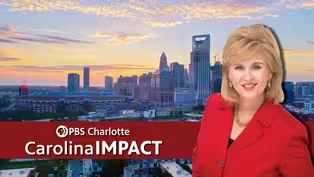
April 22, 2025 | Carolina Impact
Season 12 Episode 1223 | 28m 20sVideo has Closed Captions
In His Prime at 99: The Vibrant Veteran, Civil Rights in the 60's, Can U Cook? & LaZoom Bus Tours
Living history lessons from a 99-year-old World War II veteran; We look back at the Civil Rights Movement in our area during the 1960s; Jon Rhodes and Chef Gillian Howard host "Can U Cook?" from the Charlotte Farmers market; & LaZoom Bus Tours is now in Charlotte, offering local brewery and ghost tours.
Problems playing video? | Closed Captioning Feedback
Problems playing video? | Closed Captioning Feedback
Carolina Impact is a local public television program presented by PBS Charlotte

April 22, 2025 | Carolina Impact
Season 12 Episode 1223 | 28m 20sVideo has Closed Captions
Living history lessons from a 99-year-old World War II veteran; We look back at the Civil Rights Movement in our area during the 1960s; Jon Rhodes and Chef Gillian Howard host "Can U Cook?" from the Charlotte Farmers market; & LaZoom Bus Tours is now in Charlotte, offering local brewery and ghost tours.
Problems playing video? | Closed Captioning Feedback
How to Watch Carolina Impact
Carolina Impact is available to stream on pbs.org and the free PBS App, available on iPhone, Apple TV, Android TV, Android smartphones, Amazon Fire TV, Amazon Fire Tablet, Roku, Samsung Smart TV, and Vizio.
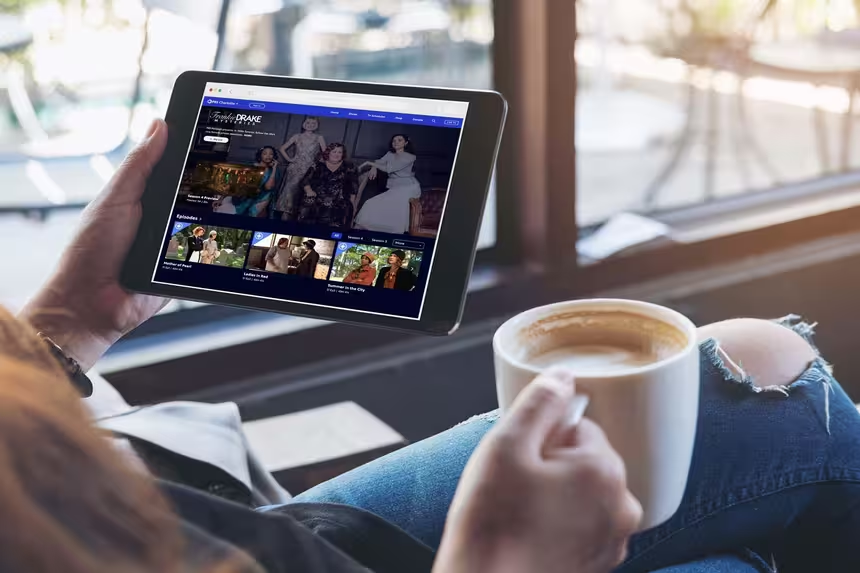
Introducing PBS Charlotte Passport
Now you can stream more of your favorite PBS shows including Masterpiece, NOVA, Nature, Great British Baking Show and many more — online and in the PBS Video app.Providing Support for PBS.org
Learn Moreabout PBS online sponsorship- [Announcer] This is a production of PBS Charlotte.
- Just out on "Carolina Impact," he may be 99, but he's still on the go.
We take a look at the vibrant life of a local World War II veteran.
Plus, do you remember our region during the '60s?
We explore the issue of civil rights during that time, and how an Asheville Company makes its mark on Charlotte's tourism industry.
"Carolina Impact" starts right now.
(bright music) Good evening, thanks so much for joining us.
I'm Amy Burkett.
Fewer than 70,000 people who fought in World War II are still alive, and all of them in their 90s.
It was the largest and deadliest battle in history, claiming over 50 million people.
Tonight, we get a living history lesson from one of those heroes.
Carolina Impact's Dara Khaalid and producer John Branscum bring us the story.
- [Dara] At 99 years old, Herschel Brown Sr. still loves going for a good cruise.
- We're gonna go right down this way.
- [Dara] He hops in his 1951 black Chevy for an occasional trip around town.
- I just get in the car and go, and I don't think anything about it.
- [Dara] He's on the road now, but he still remembers vividly the time he spent in the air during World War II.
Herschel's old uniform immediately brings back that sense of pride.
- That was a good old days.
- I'm proud.
That's my dad.
- You'd get over being scared that night, and then tomorrow, you'd do the same thing all over again.
- [Dara] Terrifying moments, as a 19-year-old ball turret gunner, flying 51 combat missions, each one never knowing if it'd be his last.
- My original crew all got shot, two of 'em got killed, and the rest were prisoners of war.
- [Dara] In the midst of uncertainty, Herschel and those fortunate enough to survive another day with him, had to find joy in little things.
- We had times when we had parties.
We drank Cokes.
No, that wasn't Coke.
(laughs) We'd have our good time every now and then.
- [Announcer] Those back home in Sharon, South Carolina kept his spirits up too, with letters and special packages.
- My grandmother used to selling cookies, and she'd always sent enough that I could pass 'em around.
- [Dara] What was even sweeter than grandma's cookies was returning home in 1945 as a staff sergeant.
Soon after, Herschel started working at a dry cleaning business.
- I went to school and learned enough about dry cleaning to run a dry cleaning plant.
And then I bought the dry cleaning plant.
And after, it was brownies.
- [Dara] But he didn't stop there.
- Bought the joining building where the dry cleaning plant was and opened up a service station, but got into the tire business and sold a little bit of everything.
- [Dara] And although work always seemed to have his attention, a beautiful distraction still managed to catch his eye.
- She was very attractive, and she was a very intelligent person.
And I don't know, we just seemed to hit it off from the very beginning and always had a good time when we were together.
- [Dara] After 10 months of dating, Herschel married Inez, a school teacher from Lucknow, South Carolina.
They built a life together for 70 years until she passed away six years ago.
Their three children still hold onto the memories.
- We don't get to choose our parents when we come into this world, and my sisters and I are very blessed that we won the lottery when we got our parents, because they're both wonderful people.
- We had home-cooked meals.
We sat around the table all together and ate and talked about things.
- These are really interesting ones.
- [Dara] A tradition they still keep, sitting at the table together, this time, looking at an old newspaper article that captures a dream their dad always had.
- "I hope my children will someday restore it so that they can show it."
- It's happening.
- And that's happening.
Finally.
- [Dara] What they're talking about is the Old Hills Cotton Gin that Herschel bought in 1986 with all the machines still inside.
For years, the family used it as a storage place.
- The building was getting in pretty foul shape, and we're gonna put a new roof on it.
I'm actually gonna enclose this whole shed area, and we're gonna pour our concrete floor in there.
- [Dara] With the repairs breathing new life into the building, one goal- ♪ I've studied my blueprints and plans ♪ - Is to turn the space into a music venue.
- It makes me tear up to know that this is a dream he's had for a long time, and I'm finally doing it.
- [Dara] And just how time doesn't slow down.
- Come, I'll show you.
- [Dara] Neither does Herschel.
The boy who grew up on a York County farm still gets in touch with his roots, by gardening.
- We'll have a tomato pretty soon.
- [Dara] His on-the-go lifestyle at nearly 100 years old inspired a family friend to write a song about it last year.
♪ He'd rather push a rototiller than a walker ♪ ♪ He's 98 years, walking in his way ♪ - And I thought, how wealthy and how rich is that, that at 98 years old, you could choose what you wanna do today?
That just seems impossible, and he still drives and he's just a funny, witty guy.
- [Dara] Although Herschel says he doesn't have a special secret to living a long life, he does keep this in his routine.
- Try to enjoy something every day, to try to find something to laugh about.
- [Dara] Which will keep him trucking right to 100.
For Carolina Impact, I'm Dara Khaalid.
- What an amazing man.
Thank you so much, Dara.
Herschel's family plans to do it up big on April 25th with a party for his 100th birthday.
Tim is even flying in from Minnesota and has a special birthday video to go along with the original song he made for Herschel.
So happy early birthday, sir, and thank you so very much for your service.
As we continue our living history lesson, tonight, we explore civil rights issues in the '60s throughout our region.
Carolina Impact's Beatrice Thompson and videographer Marcellus Jones have more on how those changes impacted not only communities, but how it changed the life trajectory for many.
- [Beatrice] The historian, the war hero, the educator, each with their own story about Charlotte's experiences during the '60s, and the impact of the major social issues, the most disruptive and effort called urban renewal.
In city after city, highways were built to appease white suburban commuters.
Through imminent domain and funds from the 1949 Housing Act and the 1956 Interstate Highway Act, freeways were shoved through minority communities, causing surrounding blight and pollution.
Among the black neighborhoods divided by those highways were Treme in New Orleans, the Brooklyn area of Charlotte, and Overtown in Miami.
The efforts saw the removal of close to 7,000 residents in Charlotte's Brooklyn community.
- So you lose this sense of identity, the sense of culture of a community that had businesses and churches all right together.
So I think that did affect African Americans.
- In the middle of my second grade year is when we experienced urban renewal, and my family had to leave the Brooklyn area.
- [Beatrice] In Brooklyn, she'd grown up experiencing community and culture, and she watched the dismantling of the community.
- It was really rough for some people, because they had to find somewhere to go.
- [Beatrice] The problem?
These neighborhoods weren't really slums.
They were areas that black citizens had been contained into, through private covenants that barred selling homes to blacks and government zoning.
While the housing was run down due to overcrowding and poverty, the neighborhoods were still functional, full of churches, grocery stores, restaurants and shops.
It was also central to the civil rights movement in Charlotte.
- Charlotte had one of the second largest sit-in movements in the country that lasted for most of the first half of the 1960s.
Off and on, they would target restaurants and other public facilities.
And so it was very, I mean, it was extremely active.
- [Beatrice] In the spring of 1963, a prominent civil rights leader led dozens of protestors on a four-mile march from Johnson C. Smith's campus to the center of Charlotte's uptown area.
Dr. Reginald Hawkins warned the city leaders that if something wasn't done to end segregation, future marches might not be so peaceful.
Similar protests took place in Rock Hill, South Carolina with the Friendship Nine, a group of black college students who were jailed after a sit-in at a lunch counter.
- We are going to sit at the lunch counter, and we are gonna stay at the lunch counter, and they're going to have to arrest us and put us in jail.
- [Beatrice] There were many who believe these organizing efforts were partially to blame for the loss of black communities like Brooklyn.
- The NAACP used these political action initiatives to get more voters on the polls, on the rolls, and they would go out and began to affect local elections.
And so some argued, particularly in the black press, that the move to disband or remove this community was an effort to try to disorganize the African American community.
- [Beatrice] And then there was the Vietnam war.
- So I joined the Marines at 17, got sent to Vietnam three months after I turned 18, got shot twice before I was 19, got shot once again after I was 19.
- [Beatrice] His family was among those forced out of Brooklyn to the west side of Charlotte.
Second War, Charlotte's original black high school was closed along with the demise of Brooklyn.
He then attended his beloved West Charlotte for one year before desegregation sent him to North Mecklenburg High School.
- At that time, North Mecklenburg was known as the rebels, as in confederate rebels.
Had a guy with a full confederate uniform and a big confederate flag waving around at all the pep rallies.
- [Beatrice] His disenchantment with school led him to join more than 300,000 Black Americans serving in Vietnam, making up 16% of the Armed Forces.
Early on in that war, Black Americans made up 11% of the forces.
Their casualty rates soared to more than 20%.
Ultimately, more than 7,000 died, 14% of all the deaths, while Blacks made up only 11% of the young males in America, but it was the first American war in which black and white troops were not formally segregated.
Yet the Black service members felt the opposition when they returned.
- That was a double-edged sword, because number one, in the '60s, you had civil rights unrest, you had campus unrest on all universities, anti-war protestors and all like that.
So I'm caught from both sides.
- [Beatrice] But when you ask all three how African Americans fared in one of America's most turbulent decades- - There's a large misconception about the civil rights movement that it was solely about integration and voting rights.
And since the country achieved those things, then the movement was successful.
But the movement was primarily about economics and access to economics.
- Well, I guess the test is still out.
I think we're moving to classism, but I think it's more economic class more than anything else.
- Right at the end of the '60s or the beginning of the '70s was when things finally started to turn around on a major scale.
- [Beatrice] In a new millennium, many are looking back to better understand history and to make sure it does not repeat itself.
For Carolina Impact, I'm Bea Thompson.
- Thank you, Bea.
This is just a small segment of a local documentary we're working on here at PBS Charlotte called "Echoes of the '60s."
Some topics you can look forward to seeing include a look at the infrastructure across the region, the music scene, local media icons, and trailblazers in sports.
Stay tuned, the documentary airs this August.
Well, we move from looking back to the present.
John Rhodes spent years blending food and fitness into one mission - helping people live healthier lives.
Now, he's taking that passion to the stage with "Can You Cook," a live cooking showdown that's part culinary battle, part nutrition class, and all about celebrating local chefs, farmers, and sustainable food.
Carolina Impact's Chris Clark takes us there.
- [Chris] At Charlotte's Farmer's Market, the stalls overflow with crisp vegetable, sweet fruits, and golden eggs.
Now, people gather for something even juicier.
"Can You Cook" is a competition where culinary creativity takes center stage, as local chefs go head to head in a battle of flavors and ingenuity, - It gives the audience two different versions of recipes and meal ideas that they can use in their homes with real whole foods.
- [Chris] The rules are simple: armed with a pair of mystery ingredients, the chefs have 15 minutes to scour the market for the perfect accompaniments and 45 minutes to turn their finds into a showstopping dish, all in front of a live audience, keeping the crowd engaged.
And the heat turned up is host chef Gillian Howard.
- I talk us through what the chefs have.
I introduced the ingredients to the audience.
We are sharing our recipes, and we're also sharing those cooking moments.
- [Chris] Before the intensity rises, let's meet the chefs bringing their A game to the kitchen.
First in the spotlight is Caleb Bass from Orangeburg, South Carolina, a Johnson and Wales grad with 10 years of cooking and catering experience.
Caleb's no stranger to the kitchen.
Even this season pro though, he can feel the heat when the stakes are this high.
- It's the intensity that comes with it, right?
That you don't know what ingredients are behind that basket.
You don't know what you're gonna do.
- [Chris] Facing off against him is Charlotte's own, Nehemiah Taylor, a kitchen prodigy.
Since the age of nine, Nehemiah honed his craft, teaching himself through online cooking videos.
Not just a vegan chef, but a dedicated vegan.
- Back when COVID happened, I spent a lot of time inside, a lot of time playing video games, and I noticed that I lost the ability to run.
I started exercising and switched over to veganism and I feel so much better.
- [Chris] It's a good thing he's back on his feet, because once the secret ingredients are revealed- - [Speaker] Red cabbage.
And North Carolina-grown sweet potato.
- We always like to throw a curve ball at the chef to test their creativity level.
- [Chris] They are off, as the clock ticks, minds race, and feet fly.
It's a sprint from strategy to execution.
- Mine's rolling, man.
- $10, right, $10 baskets?
- We only got 40 bucks though, so we gotta make it happen.
Do you guys have any Thai chili?
Still thinking mushrooms.
I want a meatiness.
- That's a giant piece of ginger.
Usually, larger ginger's less potent.
- We got Daniel's now.
Let's do onions, onions, onions, onions.
- We're looking for chilies.
- I think this will be great.
550, yeah, thank you.
Alright, we're gonna go back into the building C. There's definitely something I want over there.
- [Chris] As the chefs dash through the market snagging fresh ingredients, the competition spirit comes to life.
It's reflection of the vision behind the show, where the art of cooking meets the pursuit of a healthier, more inspired lifestyle, a stark contrast to the path founder Chef John Rhodes once followed.
- I would get off of work and I would go to McDonald's or Cookout or Wendy's.
I realized that I was 300 pounds.
While working in the industry while still smoking a pack a day of cigarettes, while still going to the bar after work.
- [Chris] The breaking point came from a picture that just couldn't be ignored and a flight of stairs that left him breathless.
- Saw a photo of myself that I look a little hefty, as well as me walking up a flight of steps one day and barely, by the time I got to the top of the steps, I could barely catch my breath.
And I realized like, hey, this is not the life that I wanna live.
- [Chris] During the pandemic, John turned his health around and found the motivation to help others do the same.
- I realized we live in a broken food system, and fitness industry is also broken as well.
- [Chris] Then inspiration struck, blending his passions with a bold idea.
- I said, hey, why not start a live cooking show here?
- [Chris] Thus start of the series, "Can You Cook?"
Let's check in on the chefs as they seem to be done shopping.
- We're gonna split these mushrooms.
- Oyster mushrooms, if you cook them well enough, they have a nice meaty texture.
- Gonna get this cabbage and these sweet potatoes cut up for our succotash.
We're gonna serve a steak dinner.
- [Chris] With just 45 minutes on the clock, it is all about chopping, cooking, and plating perfection.
Both Nehemiah and Caleb dive into the challenge, bringing their unique styles to the kitchen chaos.
Multitasking is the name of the game.
Knives flash, pots sizzle, and ingredients come together in controlled chaos, with chef Gillian jumping in with questions, keeping the chefs on their toes and the audience engaged.
- It's education, it's entertainment, and it's nutrition.
It's about coming and learning and sharing and growing and building.
- This is actually my first one, so kinda amazed at actually watching them cook in front of me.
But I am excited to try.
I think one of the chefs is doing like a vegan steak type of idea.
- [Chris] The sweet potatoes, cabbage, and other ingredients took on new identities in the hands of each chef.
Caleb is making a mushroom steak with a sweet potato succotash.
Nehemiah's making sweet potato medallions with braved purple cabbage, adding in ginger, garlic, and basil.
The heat from the burners mixing with the pressure of the relentless tick, tick, tick of the clock, pushing them toward the final seconds of the showdown.
When the clock hit zero, the cooking was done, but the real pressure had just started.
Now, it was time to let the dishes and the audience do the talking.
- I don't know if you saw it, but I was definitely sitting in the corner, watching their face reaction, and then getting a verbal reaction.
- I didn't feel pressured.
I felt confident when I was making, I might've cooked the potatoes a little bit extra, but they tasted good.
- [Chris] On this day, Nehemiah's dish earned in the top spot.
But the real feast was the show itself.
These two didn't just cook, they dazzled, delivering creations that left every plate spotless.
- The salt and sweet, they mix together very well.
- It was good to be around people that enjoy cooking, that enjoys food.
Makes me feel warm inside, and full.
- Food is a universal language that we all find common ground in.
- I would love for us to be able to expand to different farmer's markets.
Just really putting a face to these fruits and vegetables.
- [Chris] "Can You Cook" isn't just a competition, it's where creativity meets community.
Bold flavor, sizzling pans, and shared passions leave everyone inspired and hungry for more.
For Carolina Impact, I'm Chris Clark.
- Looks like a lot of fun.
Thanks so much, Chris.
It's not just adults being put to the test.
John plans to have kids, battle it out in the future as well, training up the next generation of gourmet gurus.
Finally tonight, if you've been to one of the villes, Asheville or Nashville, you've no doubt seen them, tourist and party buses all over downtown.
But it's not something you normally see around Charlotte.
That is, until now.
Carolina Impact's Jason Terzis joins us with details.
- Well, for nearly 20 years now, LaZoom has been one of the top attractions in Asheville, with a 4.8 rating on nearly 2,000 Google reviews.
But then five years ago, COVID happened.
And last fall, Hurricane Helene happened, and that got the owners thinking and spearheaded an expansion to Charlotte.
(bright music) - Alright, give it up for Jason from PBS (indistinct).
- [Jason] It's not every day I get a welcoming ovation when going on a story.
Then again, it's not every day my work takes me on a party bus.
That was the case a couple of Saturdays ago when I hopped aboard the LaZoom Fender bender.
- Alright, my name is Alex, I'll be your host today.
- [Jason] It's a three-hour local brewery tour.
- A three hour tour, and they're all dressed as sailors.
- [Jason] But as it turns out, the highlight wasn't the breweries.
It was the bus itself.
- It's the bus.
- Yeah.
The bus is the star for sure.
- [Jason] And those in it.
♪ She had to be a nomad across (indistinct) ♪ - [Jason] From the four member onboard rock band, to its eye catching New Orleans-themed purple and gold paint scheme and ruby red lips on the front- - We saw the bus drive by a couple weekends ago, and I was like, "What is that?"
And immediately, we booked it.
- [Jason] It's an attention grabber, all right.
- Hi, hello.
- So much so, people on the streets can't help but notice.
- And then the bus itself is its own beautiful billboard.
So yeah, you'll experience when you're riding the tour today just how many miles drop when we go by with the full band, and they're like, "What is that?"
- [Jason] Some even joining in on the fun.
- They're gonna remember way more what happened on the bus than they are at brewery, for sure.
- [Jason] The LaZoom Fender Bender tour departs from Camp North End.
First stop, the nearby, not a brewing company.
- Now, this is a Charlotte staple, all right?
It was started in 2011.
I want everyone, when they leave the bus, to set their phone alarms for 25 minutes, all right?
- Woo!
- Just enough time to grab a beverage of choice, enjoy the patio for a few minutes, get a quick photo out front, and get back on the bus.
- Alright, we're heading to another party.
So get those butts in your seats, and let's get going.
♪ All you wanna do is ride around Sally ♪ ♪ Ride, Sally, ride ♪ - [Jason] Onboard this particular tour and celebrating her birthday, Misty Heard.
She and all her friends donning boat captain's hats for the occasion.
♪ Happy birthday to you ♪ (crowd cheering) - For this one, I was like, live music on a bus, we love celebrating big for birthdays, so we're like, "This is it.
This is what we're gonna do."
- [Jason] Stop number two, Resident Culture Brewing Company on Central Avenue.
After just enough time for another round, it was back on the bus.
- Did you guys have fun at Resident Culture?
- Yeah.
- Woo!
- Alright, we are heading to our final brewery of the day.
- I think it's amazing.
I think it's so much fun.
People have a blast.
- The emcee is amazing.
He's killing it.
From the moment we got on, I was like, "This is awesome."
The energy he brings is just top-notch.
(singing indistinctly) - [Jason] The house band, or in this case, bus band is known as My Better Half, featuring husband and wife combo, Ellen and Frank Adams.
- And we played on several boats, but this is our first time on a bus.
So it's a learning experience.
It's been fun.
♪ I love rock 'n roll ♪ ♪ So put another dime in the jukebox, baby ♪ - The band really kind of brings in the audience and feeds off each other, and everyone is just having a really genuine good time.
- [Chris] Third and final stop on the Fender Bender beer tour, Highwire Brewing in South End.
Time for one last round in a little game of football billiards.
♪ Rock me, mama, like the wind and the rain ♪ ♪ Rock me, mama, like a southbound train ♪ - With a ride back to Camp North End, the fender bender beer tour was sadly over, but not the day though for Bus Driver Frank or tour guide Alex.
A couple hours later, these guys were back on the bus.
This time, for LaZoom's ghosted tour, a different tour with a totally different vibe.
- 10 years earlier, a woman named Foy Cooper was brutally murdered here.
There are hundreds of dead bodies in here, and the tails are too numerous to tell.
- [Chris] If you haven't heard of LaZoom Tours, there's reason for that.
They're new to Charlotte, but not new to North Carolina.
Thanks to owners Jimmy and Jen Lauzon, they've been an Asheville staple for 18 years.
- Our main vision behind it was to create a tour for the locals that they would want to have their out-of-town friends and family come on.
- So we have four different tours in Asheville.
Our flagship tour is called the "Hey Asheville."
It's an hour and a half city sightseeing tour with two person sketch comedy.
- It was the most fun thing we did in Asheville when we were there.
- [Chris] After COVID shut LaZoom down for over a full year, Jimmy and Jen began thinking about expanding outside Asheville.
Then Hurricane Helene happened, shutting them down for another six weeks.
They're finally back up and running now, but at only at about 50%.
- So we opted to take this opportunity to come to Charlotte, a city that we love.
We've got a lot of friends here, we come here often, and so we have already known a lot about the city, knew it would be a good choice for us, and just seize the moment.
So here we are.
- Yeah, we just rented a house, brought everybody down, and we're like, "Alright, let's memorize the streets, let's go to the library, get the stories."
And yeah, it's been very exciting.
- I think it's really flourishing here because it's genuine.
The owners care about what they're doing.
They genuinely care about the people riding the bus and putting a good show for them.
- [Jason] The Charlotte Ghosted Tour launched in December, with Fender Bender Beer tour in February.
- And we've started it in a really quiet time.
We started in the dead of winter, just kind of intentionally so we could work out the kinks.
- It's been a little humbling, feeling, just being so well known in Asheville and then coming here and having to explain what we do and things like that.
And people are like, "Oh, I think that'll work."
And I'm like, "It will work.
Trust me, it's awesome.
- [Jason] They're obviously hoping their LaZoom Charlotte tours will be as popular as their ones in Asheville, and so far, I'd say they're off to a pretty good start.
- Okay, it looks like a lot of fun.
How much is this gonna set us back?
- A few bucks, but fun is fun, right?
The three-hour Fender Bender tour is $59.
For now, it's on Saturdays only.
The one hour ghosted tour runs four nights a week.
It's $44, and coming this summer, the Hey Charlotte comedy tour filled with history, colorful characters, and of course comedy.
So they wanna get all the tours that they have up in Asheville happening here in Charlotte, but it's a slow process, and they kind of started in the winter to kind of see how things are going, and it's still ramping up.
- Well, you can't cross the street in Nashville without bumping into some form of a party bus.
So seems like it was just a matter of time before it came to our area.
- Absolutely.
- Thanks so much.
Pretty darn cool.
Well, unfortunately, that's all the time we have this evening.
Thanks so much for joining us.
We always appreciate your time and look forward to seeing you back here again next time on Carolina Impact.
Goodnight, my friends.
(bright music) - [Announcer] This is a production of PBS Charlotte.
Video has Closed Captions
Clip: S12 Ep1223 | 6m 23s | Jon Rhodes and Chef Gillian Howard host "Can U Cook?" from the Charlotte Farmers market (6m 23s)
Civil Rights in the 60's | Carolina Impact
Video has Closed Captions
Clip: S12 Ep1223 | 6m 32s | We look back at the Civil Rights Movement in our area during the 1960s. (6m 32s)
In His Prime at 99: The Vibrant Veteran | Carolina Impact
Video has Closed Captions
Clip: S12 Ep1223 | 5m 40s | Living history lessons from a 99-year-old World War II veteran. (5m 40s)
LaZoom Bus Tours | Carolina Impact
Video has Closed Captions
Clip: S12 Ep1223 | 6m 47s | LaZoom Bus Tours is now in Charlotte, offering local brewery and ghost tours. (6m 47s)
April 22, 2025 Preview | Carolina Impact
Preview: S12 Ep1223 | 30s | In His Prime at 99: The Vibrant Veteran, Civil Rights in the 60's, Can U Cook? & LaZoom Bus Tours (30s)
Providing Support for PBS.org
Learn Moreabout PBS online sponsorship
- News and Public Affairs

Top journalists deliver compelling original analysis of the hour's headlines.

- News and Public Affairs

FRONTLINE is investigative journalism that questions, explains and changes our world.












Support for PBS provided by:
Carolina Impact is a local public television program presented by PBS Charlotte
